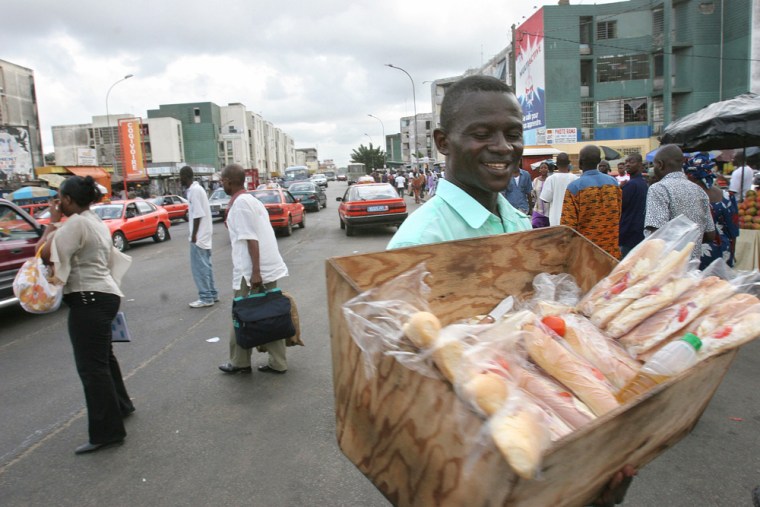Heading to class, law student Jacques Koffi makes his morning stop at a roadside news stand to cast an eye over the front pages of Ivory Coast’s papers — a barometer of tension in the war-divided country.
“This reassures me,” he said, gesturing to the tales of political tiffs and routine government business which have begun to take the place of hysterical rumors of rebel attacks.
“Sometimes the headlines make you feel sick with worry, but there’s nothing alarming today,” he said, striding along a road crammed with buses and communal taxis, books under his arm.
The West African country, divided since rebels tried to topple President Laurent Gbagbo in 2002 and seized its northern half in a short war, has been enjoying a spell of relative detente rarely experienced since the fighting ended.
Recent steps along the elusive path to peace — including the rebel leader’s return to a unity government — mark a rare break in the deadlock that has characterized the conflict in West Africa’s economic powerhouse.
Upbeat mood
In an outdoor bar in the Riviera district of the main city Abidjan, where in January residents awoke to the explosions and gunfire of an attack on two army bases, the mood is upbeat.
“The latest advances are good news. I feel they are getting down to business now,” said 24-year-old finance graduate Alphonse Niamien, enjoying an evening drink with his girlfriend.
Memories of intense riots directed at U.N. bases in the government-run South have begun to fade more than two months after they brought Abidjan to a standstill. Pro-Gbagbo youths protested against what they said was U.N. meddling.
The focus has shifted to advances achieved by new Prime Minister Charles Konan Banny, a former banker appointed in December as part of a U.N.-backed peace plan which demands all sides disarm and organize elections by the end of October.
He won plaudits for bringing Gbagbo and his arch enemy, rebel leader Guillaume Soro, together for talks in the capital Yamoussoukro earlier this year. Opposition leaders previously in exile also attended, giving a semblance of political normalcy.
University reopens
The talks set off a series of advances — Soro is back in Abidjan taking part in government work and a dispute over the composition of the independent electoral commission has been quietly settled.
Government and rebel military leaders will also meet to discuss disarmament. School pupils in the rebel zone have finally been able to sit exams and the university in the rebel stronghold of Bouake has reopened its doors.
“I think things can carry on this way. Just (political leaders) getting together is a good sign,” Niamien said.
The conflict, which rebels say erupted over discrimination against mainly-Muslim northerners and immigrants from nearby states, was supposed to end with elections last October but these failed to take place with the country still divided.
The U.N.-backed peace plan announced the same month called on Gbagbo to stay for another 12 months flanked by a new prime minister with extra powers to ensure disarmament and elections to bring peace to the former French colony.
Meanwhile, 11,000 U.N. and French peacekeepers keep the warring sides apart in their respective zones.
Strides, but lasting changes?
Banny has impressed analysts with his pro-active, hands-on approach after a seemingly timid start. However, they warn the potential for trouble remains.
“There have been real changes ... but whether that means things are going somewhere, I’m not sure,” said one Western diplomat, who added there was “no leverage” driving the foes to start planning elections which he doubted would happen.
“I think the main issues are still there and they will not get solved. I think we will see this situation last for years.”
Restaurateur Benjamin Diadie in Riviera was not sure the welcome detente would last, but said it would help start a healing process in the world’s top cocoa-producing country.
“Things had gone on so long that people thought only more fighting could settle it but now people are thinking there could be a way out. There is a beginning of hope.”
